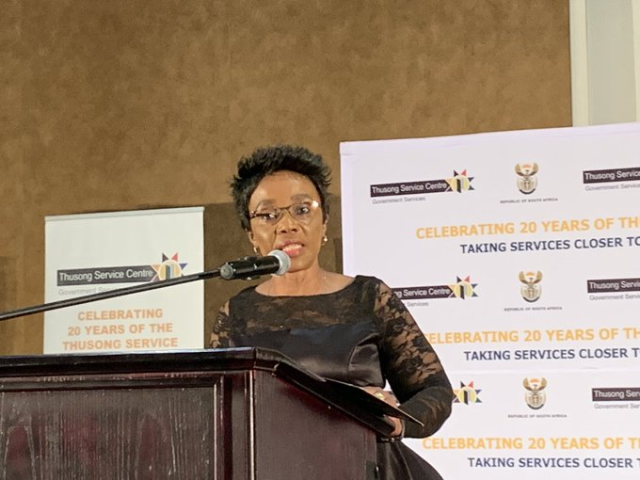Chikunga Calls for Bold Roadmap to Empower Women Through Inclusive Finance
“Let us be bold in our ambitions and unwavering in our commitment to ensuring that the financial systems of tomorrow work for all - not just a few,” said Chikunga.

- Country:
- South Africa
South Africa has taken centre stage in advancing the global agenda for women’s financial empowerment as the country hosts the Global Conference on Financial Inclusion and Women Empowerment, held from 6 to 9 May 2025 in Cape Town. This four-day event, organised under South Africa’s G20 Presidency, brings together policymakers, financial leaders, civil society, and international development partners to align on a transformative roadmap that places women at the heart of economic reform.
At the conference’s opening session, Sindisiwe Chikunga, Minister in the Presidency for Women, Youth and Persons with Disabilities (DWYPD), delivered a powerful keynote address calling for a bold and actionable agenda. She urged delegates to craft a clear roadmap with concrete measures and realistic timelines to ensure that global financial systems serve not only a privileged few but all — especially women, who have historically been excluded.
“Let us be bold in our ambitions and unwavering in our commitment to ensuring that the financial systems of tomorrow work for all - not just a few,” said Chikunga.
Advancing the G20 Women’s Empowerment Agenda
The event marks the convening of the 2nd Empowerment of Women Working Group (EWWG) alongside the Financial Inclusion Conference. It is a strategic platform to shape G20 policies through the development of a Guidelines Framework for Mainstreaming Women’s Priorities, particularly as the world faces shifting economic realities and ongoing reforms.
The conference comes at a crucial time, with mounting evidence of gender disparities in access to finance, property rights, and economic leadership. Chikunga’s speech presented a blueprint anchored in five foundational pillars of financial inclusion, which she asserted must be urgently addressed to achieve gender parity in economic development:
-
Economic Decision-Making and Policy Leadership
-
Progressive Fiscal Reforms and Global Financial Architecture Overhaul
-
Women’s Access to Land and Productive Assets
-
Elimination of Gendered Trade Barriers
-
Access to Financial Capital and Services
A Call for Gender-Responsive Economic Governance
Chikunga emphasized the importance of gender-responsive budgeting across all government departments and sectors, urging for institutional reforms such as the creation of meaningful quotas for women in financial institutions and regulatory agencies. She advocated for the establishment of specialized economic advisory councils that can amplify women’s voices in high-level decision-making.
“Only through systemic integration of women’s perspectives can economic policies be truly inclusive and sustainable,” she said.
Addressing the $1.7 Trillion Financing Gap
A central focus of her address was the alarming $1.7 trillion financing gap for women entrepreneurs, as estimated by the World Economic Forum. Chikunga criticized traditional banking systems for failing women, particularly due to collateral-based lending models that do not consider women’s limited property ownership and gender-biased lending practices.
To close this gap, she called for:
-
Specialized women’s banking initiatives
-
Scaled-up credit programs with formal banking pathways
-
Gender-responsive investment funds
-
Reforms to discriminatory property and inheritance laws
“Without access to capital, women’s entrepreneurial potential remains severely constrained,” she stated. “We must transform our financial institutions to meet women where they are — not where the current system assumes they should be.”
Land Rights and Ownership: A Cornerstone of Inclusion
The Minister highlighted the critical importance of land and productive assets, noting that economic inclusion is impossible in the absence of ownership and control over these resources. She called for the dismantling of legal, social, and customary practices that continue to hinder women’s land rights.
“Economic inclusion cannot coexist with landlessness,” Chikunga said. “We must ensure that women not only own land but are empowered to use it as leverage for enterprise and development.”
Empowering Women in Trade and Energy Transition
Looking ahead, Chikunga challenged delegates to explore how women can be positioned at the forefront of trade and the green economy, especially as Southern Africa plays a pivotal role in the global energy transition. She cited the region’s rich reserves of critical minerals — such as lithium, cobalt, and rare earth elements — that are vital for renewable technologies.
She posed a provocative question to the audience:
“How do we position women at the forefront of beneficiating the projected surge in minerals critical to energy transitions and their related value chains?”
Chikunga urged stakeholders to develop strategies that empower women across the energy and trade sectors, leveraging this moment to build inclusive economic structures from the ground up.
Looking Ahead
As the conference unfolds, expectations are high for delegates to propose actionable commitments that will feed into the broader G20 policy frameworks and national strategies. South Africa’s leadership in hosting this landmark event underscores its intent to drive gender equity globally, not just in rhetoric, but through transformative economic policy.
“This is not the time for symbolic gestures,” Chikunga concluded. “It is time for structural change. Let us build financial systems that recognize, reward, and elevate women’s contributions.”
The outcomes of this conference are expected to inform future G20 summits and development agendas — marking a decisive step toward economic systems that are truly inclusive and gender-equitable.
ALSO READ
Germany Pioneers New Grid Fees for Renewable Energy Transition
Reliance Power's Solar Surge: Leading India's Energy Transition
Brazil Balances Oil Exploration and Clean Energy Transition
BRICS Champions Sustainable Energy Transition and Global Collaboration
Historic Land Rights Demand for Goa's Tribals










